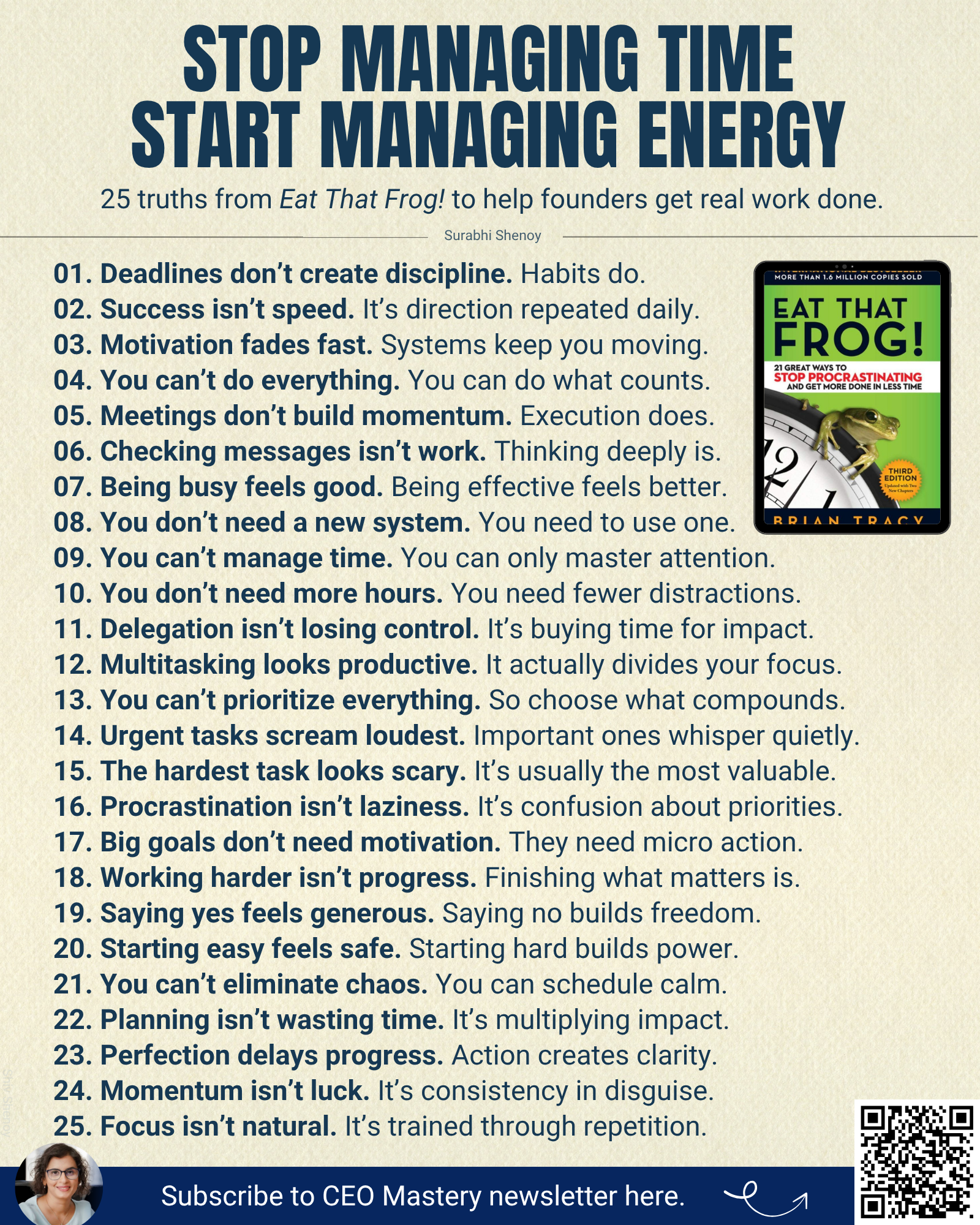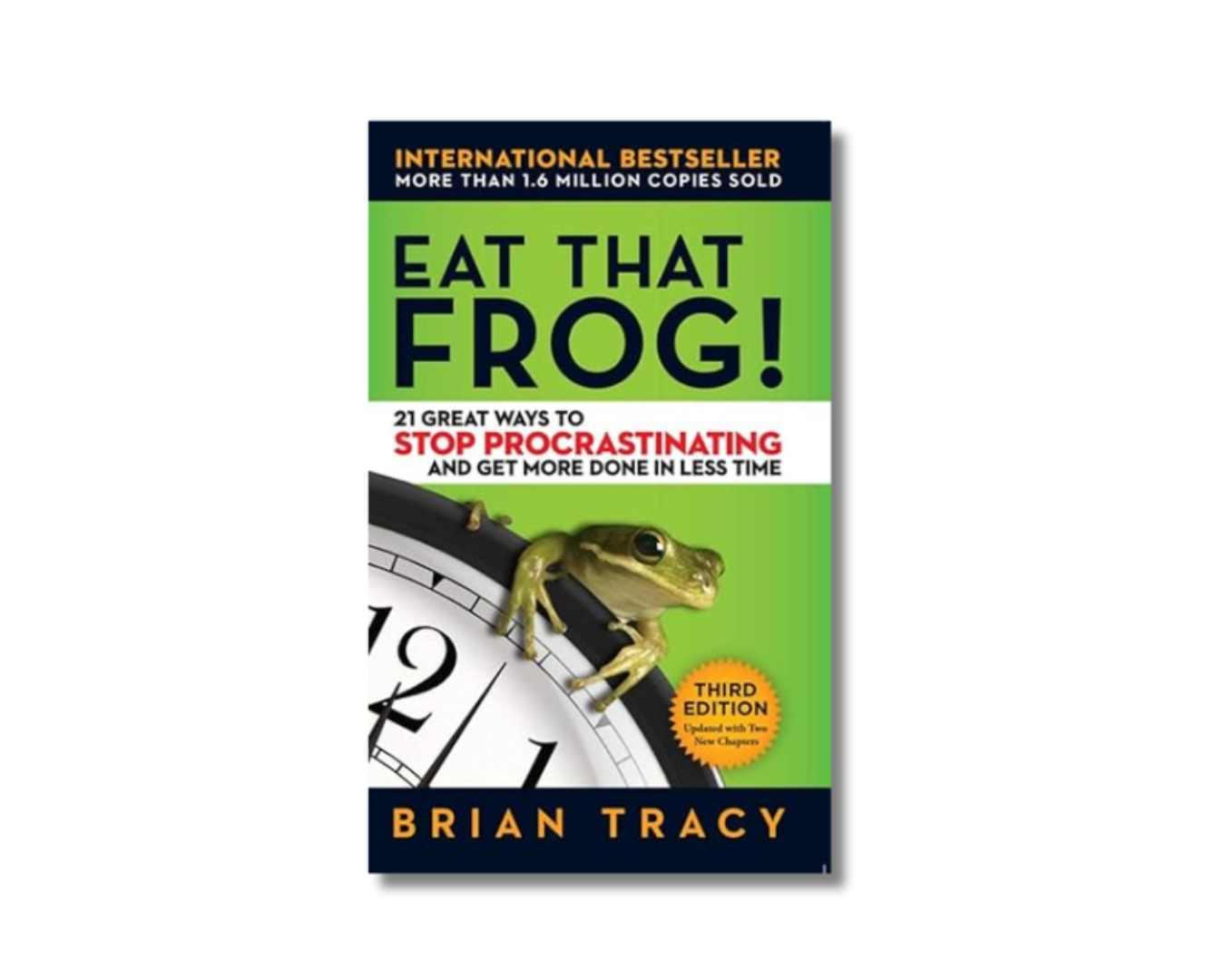Every founder starts with big ideas.
Few build systems strong enough to see them through.
Between investor updates, product reviews, hiring, and firefighting, their calendars fill up, but their priorities do not move forward.
That is where Eat That Frog! by Brian Tracy becomes a tactical advantage. It is not just a book about time management. It is a guide to mastering focus and building productivity habits for founders that translate into real growth.
Here is how to use its ideas to stop reacting and start building deliberately.
1. Tackle the ugliest, highest-impact work first
Tracy’s famous metaphor, “eat the frog,” means doing the hardest, most important task of the day before anything else.
It is simple but transformative. Most founders burn hours clearing small tasks before they get to the work that actually moves revenue, customers, or valuation. That is backward.
The real leverage lies in the few high-impact decisions that shape the company’s direction. Everything else is noise.
What this means for you:
- Start each day with one non-negotiable task.
- Protect 90 minutes in the morning for deep, strategic work.
- Resist the urge to warm up with easy tasks.
2. Focus on the 20% that drives 80% of results
One of the most powerful execution systems for entrepreneurs is ruthless prioritization. Tracy reminds us that not all tasks are equal, and most are not.
In any business, a small fraction of activities create the majority of outcomes. Yet many founders fill their days with low-leverage work because it feels urgent.
Shifting your focus to the 20% — the tasks tied directly to revenue, customers, or growth — is how you compound results.
What this means for you:
- Audit your to-do list weekly and eliminate low-value work.
- Ask: “If I could only do three tasks today, which would matter most?”
- Align your calendar with strategic priorities, not busywork.
3. Break big goals into small, repeatable actions
One reason founders procrastinate is not laziness, but overwhelm. Big goals feel too heavy to start.
Tracy’s solution is to break them into small, actionable steps. Progress builds momentum, and momentum beats motivation every time.
This is especially true for strategic work such as building new revenue lines, launching a product, or entering a new market. When broken down, even complex projects become daily habits.
What this means for you:
- Define the first step, not the perfect plan.
- Create 15-minute micro-tasks to start momentum.
- Track daily progress, not just end results.
4. Guard your time like your capital
In the early stages, founders guard their cash. In the scaling stage, they must guard their time with the same intensity.
Tracy calls time the raw material of results. Every “yes” to a meeting, a favor, or a distraction is a “no” to strategic progress.
Execution systems for entrepreneurs depend on boundaries. Without them, even the best strategies die in the noise of busywork.
What this means for you:
- Audit where your hours go weekly.
- Delegate or automate anything that is not high-leverage.
- Use your calendar as a filter, not a suggestion.
5. Build habits that outlast motivation
Motivation is fleeting. Discipline is scalable.
Tracy argues that the most successful leaders do not rely on feeling inspired. They rely on systems. They build habits that run even when energy is low and willpower is thin.
When those habits align with the company’s biggest priorities, progress becomes inevitable.
What this means for you:
- Pair new habits with existing routines to make them stick.
- Use weekly reviews to refine and reinforce them.
- Treat discipline as a strategic asset, not a personal trait.

Final Thought: Productivity Is a Leadership Skill
Founders often see productivity as a personal trait, a nice-to-have quality that helps them get more done.
But in reality, productivity is one of the most strategic skills a leader can develop. It determines how quickly you can test, iterate, and scale. It shapes how your team models priorities. And it decides how much of your vision becomes reality.
If you want to scale without burning out, start by mastering how you use your time.
The best place to begin?
Pick one principle from Eat That Frog! and apply it this week.
Make it a habit.
Then layer on the next one.
Because execution is not about doing more.
It is about doing what matters, deeply, deliberately, and without delay.

